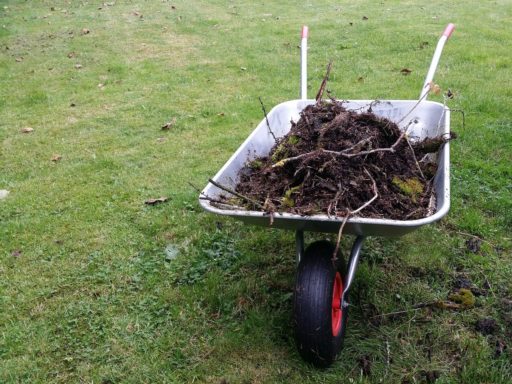Ruined gardens encircle me. Outposts of abandoned hope. Early last spring, when the discouragement and lassitude of southern summers was far from memory, I enlisted my older boys to dig an hügelkultur pit. The idea is that you gouge a patch of earth six, ten, maybe twenty feet in diameter and a foot or two deep. I’m sure this is done in meters wherever hügelkultur originated, but all I know are feet.
Perhaps you don’t know what an hügelkultur is. My computer does; every time I get the spelling right, it rewards me with a little umlaut over the first U. It also corrects my spelling of umlaut. I’m deliberately spelling it incorrectly, so that my computer has to come behind and correct me. This is what makes me a bad gardener—my tendency toward reverie. None of my raised-bed boxes are even, nor my hand-tied trellises straight. I get too close to a thing, to where I can’t see its crookedness. Aside from human beings, you need to step back aways to see the crookedness in a thing. I wish I were a step-back person. Crookedness in a trellis you can fix before too many ties go in. But crookedness in man? What’s the point of seeing it?
Back to my hügelkultur. Well, not yet. I’d just like to say here that I wish I knew other words with umlauts, so I could type them and have my computer fix my work. I wish it could follow me everywhere, straightening my crooked trellises after I tie them. Quietly correcting the poor advice I give my sons.
Now the hügelkultur, for real this time. What you do is you have your children dig a sizable pit. Have them set the dirt beside it in a pile. Give them a pick or a sharp shovel to break up the roots. You probably have to pay them. I paid my boys. I want them to feel in their muscles the unjustness of minimum wagery. How backwards it is that the hardest physical work can bring the lowest pay. Not because it’s easy, I tell them, but because anyone with muscles can do it.
This isn’t even true; if I didn’t force my sons to dig my hügelkultur for minimum wage, there’s not a soul in Hickory Shore I could get to do it on the open market. Probably not even if I paid $15 an hour. I could find a man my age with a ruined back to bring a mini-excavator to do it. I could put my toddlers on my knees within our covered porch and we could watch the excavator make a ground-up trail to my intended hügelkultur spot. I could give the man roughly what I’d pay my boys to do it over a couple of days by hand. But this is good for them. And I need them tired.
I realize I’ve gotten off track again. This is what happens when I build a trellis. I am sorry for my crooked fieldwork. What you do once your kids or the ruined-backed man with an excavator have dug your hügelkultur pit is you gather brush. Fallen limbs and soft, moldy sticks. The pile of weeds your wife pulled and left to rot in the sun. The yellowed and swollen cucumbers you missed when you were gathering vegetables before barbarian waves of crabgrass and nutsedge demoralized you. The crabgrass and nutsedge and Carolina geranium you yanked in fits of pique, mounding their bodies at the edge of your vegetable beds like a warning, even as their brethren tunneled beneath the rows. The jalapeño plant you accidentally murdered as you fought loose a pokeweed stalk. Throw it all into the pit. Hügelkultur may well be Norwegian for grave.
After you’ve laid in the remnants of death and failure, layer back on the sod. Be sure to lay grass-side down. Did you forget, like me, to tell your sons this was the plan? If so, those strips of sod now lie compressed under a few hundred pounds of mounded soil. That’s okay; tell them to dig their way down to it. You’re paying them by the hour. They’re learning the dignity of manual labor.
It didn’t matter anyway, how we built it. The summer came as it usually does, and it ruined my hügelkultur as it suffocated my gardens. I haven’t the time to protect them all. Or perhaps it’s patience I lack, or faith. Faith is, I suppose, an outgrowth of patience. Or is it the other way around?
Either way, none of us has a choice but to wait out this longest of winters. And now, in the gathered dark, sleet peppers our roof. It pelts the spiky bones of my hügelkultur graveyard, it sticks to the barn, the deck, the bent and enduring trees. It scales limbs, leaves, and every outstretched thing. I stand at my bedroom window in a blanket and watch sleet sapphire the dawning landscape. The first thunder comes minutes later, only it isn’t thunder, it is the crack of a limb tearing loose, a long and remorseless crepitation met by silence, then a thump. Some minutes later comes another crack, another thump. All day long, we listen to the sky fall.
There is no predicting when trees nor men will break, nor the particularity of their faltering. A tall and straight pine in the eastern field simply topples, as if killed by fright. A redbud bends to the earth without breaking, shouldering the weight as a burdened beast and within it something like faith that this too shall pass. Some trees are sundered to their roots, revealing a rot that’s crept up through their centers. Scores of widow-makers spear the earth amidst a grove of oak and poplar, as if a battle raged here in the darkness.
The apple tree beneath my window has died. Sometimes you can see the spirit of a thing, even beneath its bark and ice, and the spirit has left this tree. I know it surely as I know what I see in the mirror. It has died, just when I was thinking I might be able to coax from it something other than the small and bitter fruit of its long decline. I should have tended to it while there was time.
What dies in harshest winter would not have served you well, so best to be shorn of it. This is what I tell myself. This has become a litany in my head. When spring comes, we’ll try again. We’ll cut these trees for firewood, we’ll burn the thicker brush, and we’ll layer the rest in new beds. What dies can feed you, if you’ll have but the faith to lay it in the ground. If you’ll just lay it down while you may. Give to the winter and the earth their dead, for spring is coming, as it nearly always does. Spring is coming, and there’s work yet to be done.
Tony Woodlief lives and writes in North Carolina. His short fiction has appeared in Image, Ruminate, Saint Katherine Review, and Dappled Things, while his essays about parenthood and faith have appeared in The Wall Street Journal, Comment, and The London Times. He runs a website for fathers called Intentional Fathering, and can occasionally be found on Twitter.





